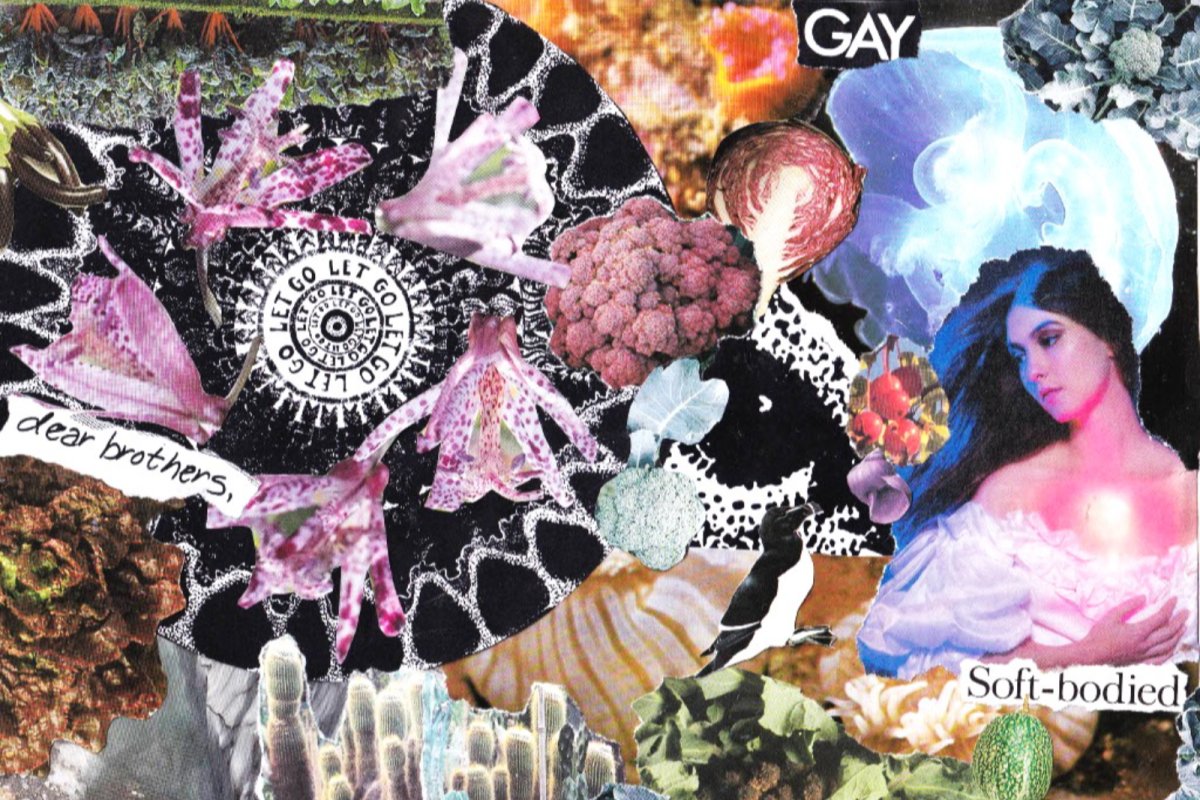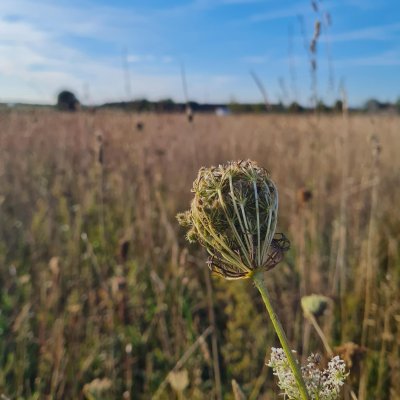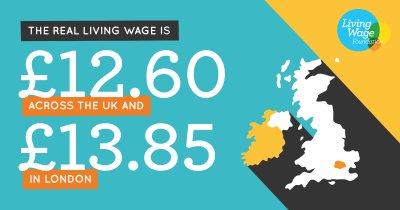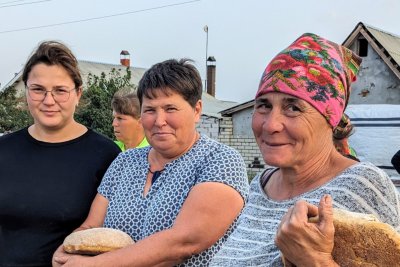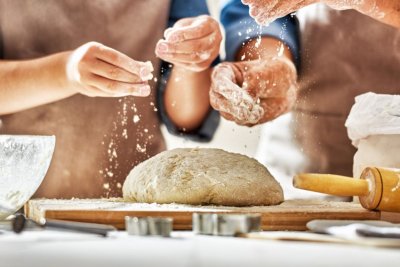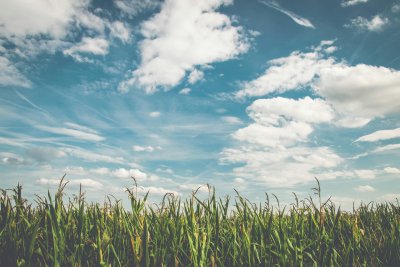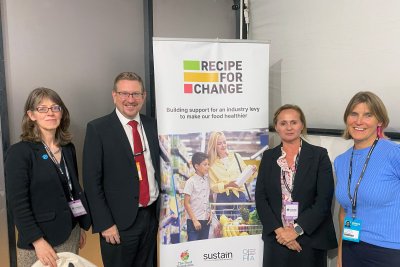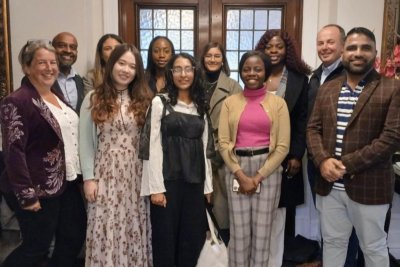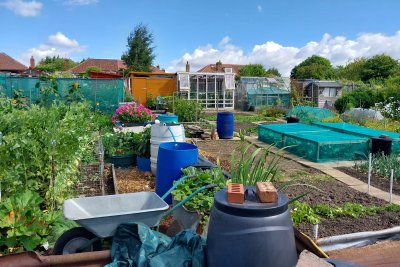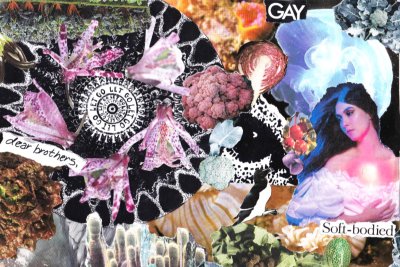 Queer Nature collage zine page by LGBTQI+ Gardening Group and Glasgow Food Policy Partnership. Credit: Fi, coordinator of the Govanhill Baths LGBTQI+ Gardening Group, part of a collaborative collage zine
Queer Nature collage zine page by LGBTQI+ Gardening Group and Glasgow Food Policy Partnership. Credit: Fi, coordinator of the Govanhill Baths LGBTQI+ Gardening Group, part of a collaborative collage zine
Eat the Rainbow - LGBTQ+ inclusion and celebration in the food movement
Is the food and farming sector a truly welcoming environment for LGBTQ+ people? Isabel Rice and Vera Zakharov of Sustain consider the implications of ignoring this element of diversity and inclusion in growing and food projects, and the rich opportunities in bringing food and LGBTQ+ movements together.
A note on terminology: at Sustain we use the acronym LGBTQ+ when referring to the many and diverse communities identifying beyond the dominant cisgender and heteronormative experience (see Sustain’s diversity style guide for more information on portraying and providing a platform for diversity and racial justice in the food and farming system).
In parts of this blog, we use the language that particular groups use to self-identify, including the term ‘queer’, specifically where the groups profiled use this as a preferred term, but recognise that not everyone within LGBTQ+ communities has a positive relationship with this term. Sustain is committed to working to improve diversity, equity and inclusion, and to promote racial justice in the food and farming sector. Read our progress report to find out more.
We eat the rainbow for our health and grow a rainbow of wildflowers for the sake of biodiversity, but we rarely see a rainbow flag or speak of the inclusion of LGBTQ+ communities in our food and farming movement.
This is not to say that the food movement (be it farmers, advocates, public personalities, local food workers or community volunteers) isn’t populated with people who identify as gay, lesbian, bisexual, trans, queer, intersex, two spirit, asexual, non-binary or otherwise in contrast to heteronormative expectations. However there are rare moments spelling out that people are welcome in food and farming spaces as they are, and rare projects that convene communities of LGBTQ+ identities over food.
Food access and LGBTQ+ identities
Food insecurity - the inability to access an adequate and nutritious diet in socially acceptable ways - is an issue of rising profile in the UK. With the Covid-19 pandemic and recent cost of living issue coming on top of a pre-existing poverty crisis, the latest figures from The Food Foundation show that a shocking 9.3 million adults (18% of households) and 24% of households with children experienced food insecurity in January 2023.
Some groups face additional barriers to accessing the food they need and are at higher risk of experiencing household food insecurity, including people of colour, disabled people, and those with no recourse to public funds status. These barriers are often linked to issues of systemic oppression, such as racism, ableism, and other forms of prejudice. During Pride Month, we are highlighting one group that may be at higher risk of food insecurity, and face exclusion from the food and farming system, but are less often talked about.
There is limited research relating to experiences of food insecurity and LGBTQ+ identities in the UK. However a 2021 survey conducted by the U.S. Census Bureau and the UCLA Williams Institute in the USA revealed that 13% of LGBTQ+ adults reported food insecurity during the covid-19 pandemic, compared to 7.2% of non-LGBTQ+ adults, and 20% of transgender adults experienced food insecurity, compared to 8% of cisgender adults.
There are some signs that issues relating to the root causes of poverty and exclusion may well be similar here. The new report from the food bank network Trussell Trust, Hunger in the UK states that more than a quarter (27%) of people who identify as LGBTQ+ reported experiencing food insecurity in the last 12 months, compared to 13% of people who do not identify as LGBTQ+.
Research from Stonewall, the lesbian, gay, bisexual, and transgender rights charity, found that:
- Almost one in five LGBTQ+ people have experienced homelessness, and 25% of transgender people.
- A third of transgender people have been discriminated against because of their gender identity when visiting a café, restaurant, bar or nightclub in the last year.
- Almost one in five LGBTQ+ people looking for work said they were discriminated against because of their sexual orientation or gender identity while trying to get a job in the last year.
Where these identities overlap with other minoritised identities people may face multiple levels of discrimination:
- 12% of Black, Asian and minority ethnic LGBTQ+ people reported losing a job in the last year because of their LGBTQ+ identity, compared to 4% of White LGBTQ+ staff.
- 11% of transgender employees and 9% of LGBTQ+ disabled people reported losing a job in the last year due to being LGBTQ+.
With the Trussell Trust Hunger in the UK report showing that people who identify as LGBTQ+ are more likely to experience food insecurity than those that don’t, but less likely to attend a food bank, and figures from Stonewall showing ongoing prejudice in public spaces, it follows that members of LGBTQ+ communities in the UK may feel unwelcome or unsafe in certain community food spaces due to a fear of experiencing prejudice, despite being at higher risk of food insecurity.
This certainly will not be the experience of everyone within LGBTQ+ communities, which is by no means a homogenous group, however this is an issue that deserves examining. If you are part of a community food space, ask yourself, could we do more demonstrate that we are an inclusive and welcoming space? Is it clear to LGBTQ+ people that this space is for them?
At the time of writing this article we found a lack of statements on LGBTQ+ inclusivity on the websites of UK charitable food aid organisations - but this is not to say that these don't exist beyond public view. We are very interested in engaging with the charitable food aid sector on this subject, and are keen to platform community food projects actively working to ensure their spaces are inclusive and safe for everyone. We are also particularly concerned at the lack of research on the impacts and experiences of food insecurity on LGBTQ+ communities, and welcome efforts among our colleagues in exploring this further.
Growing the rainbow
This Pride Month we are celebrating some wonderful community food projects that actively work to involve LGBTQ+ people and create safe and affirming spaces to enjoy and engage with food – read on to be inspired!
A central role of food beyond nutrition is how it brings people together and signals care. And indeed, many food and growing projects emphasise inclusivity and a culture of welcome, creating spaces for community cohesion, friendship and healing, not just productive food activities. While there is so much more to be done to ensure food-related community groups are inclusive and safe spaces for everyone, some projects are already leading the way in bringing both food and LGBTQ+ movements together.
Hosted by the Govanhill Baths Community Trust in Glasgow, the LGBTQI+ Gardening Group brings together green-fingered folks in the area and across Glasgow to grow food, learn about herbalism and foraging, as well as exploring themes like decolonising the garden and queer ecology. This is a school of thought that understands nature as all-encompassing and rejecting binaries such as natural and unnatural, both in terms of environments and human experiences, ultimately embracing diversity in the natural world. The group collaborated with the Glasgow Food Policy Council on a collage zine project creatively exploring their relationship with queerness, food and food action, and the Glasgow City Food Plan.
In London, the Queer Botany project explores and affirms connections between queerness and nature, rooted in queer ecology. They host talks, guided tours and creative workshops exploring plants from a queer perspective, collaborating with the Chelsea Physic Garden, the Wellcome Collection, RHS and others. The project aims to share marginalised perspectives and support more diverse representations in the environmental movement and the outdoors.
Also in London, Misery Party is a mental health collective which begun as a sober queer club night, but since 2022 has hosted monthly foraging and herbalism walks (Misery Medicine) specifically for LGBTQ+ people of colour. They host their monthly nature gathering at the Bethnal Green Nature Reserve.
AgRespect is a network and advocacy organisation for LGBTQ+ people in agriculture and rural communities. In a sector that is predominantly cisgender, heterosexual, White and male, AgRespect works to support LGBTQ+ people to be open about their sexuality and to live authentic lives in their community, demonstrating that “Embracing our differences doesn’t only make life more colourful, it can also bring success and resilience to communities and rural enterprise.” AgRespect member Karen Fisher, a Herefordshire farmer and Farming Advisor with the Soil Association, wrote about her experience feeling isolation around her identity in a rural upbringing, and the importance of demonstrated inclusion not only in farming jobs but also training and higher education – where a lack of diversity may turn young people away before they even have a chance to start in the sector.
Based in Brighton & Hove, Lunch Positive is a pioneering project running a weekly lunch club and supportive community space for people living with and affected by HIV. While the project supports cisgender, heterosexual, and LGBTQ+ people, they regularly collaborate with and support projects celebrating LGBTQ+ communities and dismantling discrimination, including providing free meals at the Transgender Day of Remembrance, simultaneously supporting friends and allies and bringing the power of food into spaces for grief and healing.
Supporting a spectrum of generations, identities and socioeconomic distinctions, the project recognises that even in a generally welcoming community such as Brighton, people’s historical and current experience of homophobia and HIV discrimination are ongoing traumas that can impact mental health and self-care, something a shared meal can begin to address. Project lead Gary Pargeter says:
"Sharing a delicious meal can be a gift of kindness. It shows that someone cares. Food communicates love."
In Belfast, community gardens Rainbow Alley, Eden Alley and Grow celebrate Pride Month every year, creating a roster of welcoming open garden days in June and invite everyone in their communities to get growing. In 2021 Grow hosted an event Planting with Pride, in collaboration with Social Farms and Gardens NI and the Rainbow Project, an organisation working to improve the physical, mental, and emotional health and wellbeing of LGBT+ people in Northern Ireland. This event brought together LGBTQ+ people and their families to get involved in growing, including those new to the world of growing and nature connection, and the benefits of these activities to their overall wellbeing.
Cross-pollinating our movements
These groups illustrate the importance of cultivating a community of peers that can relate to one another’s unique personal experiences, not just in growing, cooking and accessing food, but in life in general. They can be spaces for voicing ongoing discrimination, exclusion and isolation, while offering connection, comfort, resilience and solidarity. These are the manifold benefits of food and growing projects - which LGBTQ+ communities deserve as much as any others.
But they also embody the many gifts of LGBTQ+ movements to the work of improving the food and farming system, which are as numerous and diverse as any healthy ecosystem. By bringing in considerations of meaningful inclusion and rights-based activism, we move towards a food system that celebrates and learns from diverse experience, and gives more people a seat at the (dinner) table.
By considering needs around self-care, community care and wider rights to physical, mental and emotional health, such collaborations underscore and strengthen the role of food and growing in repairing the toll of broken food and social systems. By creating and affirming the inclusion of, and outright invitation to, communities facing hostile discrimination and its impacts on poverty and food insecurity, we attend to a core value of the community food sector in providing a safety net and a route toward resilience, and ultimately positive social change.
We want to hear from you! Get in touch if your food and/or growing project is working with and supporting LGBTQ+ people – we’d love to hear more stories.
Food Poverty: Millions of people in the UK struggle to get enough to eat. We’re working to change that through people-powered projects and campaigns that tackle the root causes of food poverty and ensure everyone has dignified access to healthy, affordable food.
Sustain
The Green House
244-254 Cambridge Heath Road
London E2 9DA
020 3559 6777
sustain@sustainweb.org
Sustain advocates food and agriculture policies and practices that enhance the health and welfare of people and animals, improve the working and living environment, promote equity and enrich society and culture.
© Sustain 2024
Registered charity (no. 1018643)
Data privacy & cookies
Icons by Icons8
